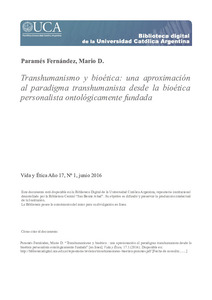Por favor, use este identificador para citar o enlazar este ítem:
https://repositorio.uca.edu.ar/handle/123456789/1492| Campo DC | Valor | Lengua/Idioma |
|---|---|---|
| dc.contributor.author | Paramés Fernández, Mario D. | es |
| dc.date.accessioned | 2019-05-02T13:57:42Z | - |
| dc.date.available | 2019-05-02T13:57:42Z | - |
| dc.date.issued | 2016 | - |
| dc.identifier.citation | Paramés Fernández, Mario D. “Transhumanismo y bioética : una aproximación al paradigma transhumanista desde la bioética personalista ontológicamente fundada” [en línea]. Vida y Ética, 17.1 (2016). Disponible en: https://repositorio.uca.edu.ar/handle/123456789/1492 | es |
| dc.identifier.issn | 1515-6850 | - |
| dc.identifier.uri | https://repositorio.uca.edu.ar/handle/123456789/1492 | - |
| dc.description.abstract | Resumen: El transhumanismo es un movimiento que promueve la aplicación de los avances científicos con el objeto de modificar las capacidades humanas, aspirando a superar los límites naturales y otorgar al hombre un total control sobre su cuerpo y mente. La piedra angular del transhumanismo es la afirmación de que la naturaleza humana no es inmutable y que el hombre es radicalmente perfeccionable. En ese proceso, desde el presente humano hacia el hipotético futuro poshumano, es necesario transitar una etapa intermedia, la que se corresponde con la del sujeto transhumano. El transhumano (humano+) es sólo el individuo en fase de transición hacia el poshumano (humano++). El transhumanismo es una potente ideología que pretende constituirse en un nuevo paradigma y que tiene como credo filosófico la superación de las limitaciones del hombre, a través de la razón, aplicando la ciencia y la tecnología, constituyendo un problema bioético de gran calado, debido a que la puesta en práctica de sus ideas podría atentar contra la dignidad humana. | es |
| dc.description.abstract | Abstract: Transhumanism is a movement that promotes the application of scientific advances in order to modify human capacities, aiming at surpassing the natural limits by providing human beings with full control over their minds and bodies. The cornerstone of transhumanism is the claim that human nature is not immutable and man is radically perfectible. In the process, from the human present to the hypothetical post-human future, it is necessary an intermediate stage, which corresponds to the transhuman subject. The transhuman (Human +) is only the individual in transition to the post-human (Human ++). Transhumanism is a powerful ideology that tries to become a new paradigm; its philosophical credo is the exceedance of human limitations by the use of reasoning and the application of science and technology which results in a bioethical problem of paramount importance, since its practice might endanger human dignity. | es |
| dc.format | application/pdf | es |
| dc.language | spa | es |
| dc.language.iso | spa | es |
| dc.publisher | EDUCA | es |
| dc.rights | Acceso Abierto | es |
| dc.rights.uri | https://creativecommons.org/licenses/by-nc-sa/4.0/ | es |
| dc.source | Vida y ética, 17(1), 2016 | es |
| dc.source | ISSN 1515-6850 | es |
| dc.subject | BIOETICA | es |
| dc.subject | TRANSHUMANISMO | es |
| dc.subject | PERSONA HUMANA | es |
| dc.subject | CIENCIA | es |
| dc.subject | TECNOLOGIA | es |
| dc.title | Transhumanismo y bioética : una aproximación al paradigma transhumanista desde la bioética personalista ontológicamente fundada | es |
| dc.type | Artículo | es |
| uca.path | Vida y Ética|2016 Año 17 nº 1 | es |
| uca.disciplina | BIOETICA | es |
| uca.filename | /home/data-uca-generic/folder_generic/Revistas de la Universidad/Vida y Etica/vidayetica2016-1/transhumanismo-bioetica-parames/metadata.xml | es |
| uca.issnrd | 1 | es |
| uca.affiliation | Fil: Paramés Fernández, Mario D. Universidad de Buenos Aires. Facultad de Ciencias Médicas; Argentina | es |
| uca.orden | 03 | es |
| uca.version | publishedVersion | es |
| item.fulltext | With Fulltext | - |
| item.languageiso639-1 | es | - |
| item.grantfulltext | open | - |
| Aparece en las colecciones: | VE - 2016 Año 17 nro. 1 | |
Ficheros en este ítem:
| Fichero | Descripción | Tamaño | Formato | |
|---|---|---|---|---|
| transhumanismo-bioetica-parames.pdf | 481,29 kB | Adobe PDF |  Visualizar/Abrir |
Visualizaciones de página(s)
1.728
comprobado en 30-abr-2024
Descarga(s)
5.122
comprobado en 30-abr-2024
Google ScholarTM
Ver en Google Scholar
Este ítem está sujeto a una Licencia Creative Commons

